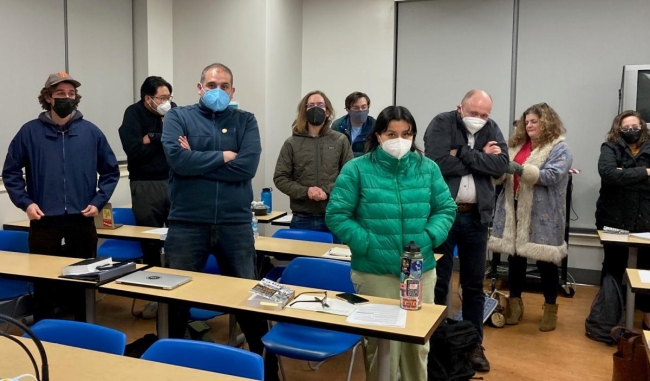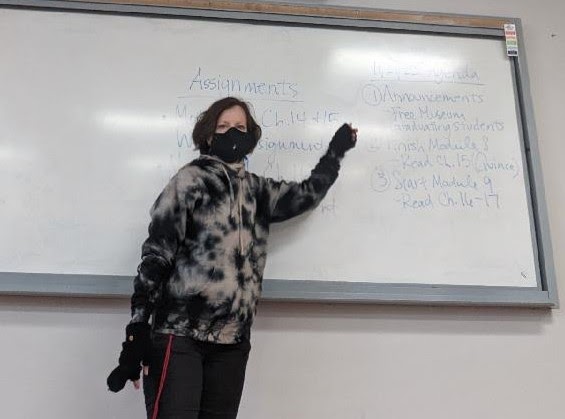You have /5 articles left.
Sign up for a free account or log in.

City College students bundle up for a night class.
AFT2121
The City College of San Francisco Board of Trustees held an emergency meeting Tuesday to approve funds for much-needed fixes to the heating systems on several campuses. The meeting came after months—and some say years—of complaints from students, faculty and staff members about overly chilly classrooms caused by aging or broken heating systems.
Alan Wong, president of the board, said the current classroom conditions are unacceptable. He noted that he received emails from faculty and staff members and students as far back as winter 2021 about heating issues, which he forwarded to college administrators. But a new deluge of messages about the problem came this winter.
“Cold classrooms are not conducive to learning and need to be fixed ASAP,” he said. “The primary goal of the emergency meeting for me [was] to put the heat on our administration to be responsive to our students and to urgently fix these issues and not treat it as business as usual. As I said several times during the meeting, as long as our students are not getting heat, the heat should be on us.”
Prior to the meeting, he had some instructors take him on a tour of one of the affected campuses, where the meeting was held, to experience the cold for himself.
Malaika Finkelstein, who serves on the grievance team for AFT2121, the college’s faculty union, said she started hearing about ongoing heating problems in buildings at two of the campuses this past fall, while the campus where she teaches has been without working heat for years. An unusually cold winter in California brought the issue to the fore, and the union has been posting updates to a faculty blog documenting the low classroom temperatures.
Finkelstein, who is also an instructor for the college’s Disabled Students Programs and Services, said the temperature in her classroom has mostly been in the low 50s, but other rooms have it worse, dipping into the 40s, especially during night classes. She noted students have left her class because of the cold, and she’s heard that some students in other classes dropped their courses altogether. Faculty members started posting signs on their classroom doors where they keep a log of class temperatures to urge administrators to address the problem.
“I had a student last week literally ask me why nobody cares,” Finkelstein said. “That was heartbreaking. Being a community college student is challenging … You’re juggling work schedules and childcare schedules and arranging your life so that you can be in school. And doing all of that when it feels like the college, the administration, isn’t on your side, why would anyone bother?”
The college provided space heaters to warm classrooms, but only one can be used per classroom in order not to overtax the college’s electrical systems, according to a statement from Wong.
Disposable handwarmer packets were also doled out to faculty members on Finkelstein’s campus, but they didn’t do much good, she said.
“I had one packet, which includes two handwarmers,” she said. “What am I supposed to do, pass it around so each student can hold it for a minute?”
She believes the cold affects students’ ability to learn.
“You walk into the classroom, and your hands start hurting and it’s hard to pick up a pen,” she said. “It’s hard sometimes on bad days for people to concentrate. People can’t sit still easily. It’s already hard to sit still. And this is coming off the COVID shutdown. Some of my students, this is the first time they’ve been back in person since COVID, and I’m not able to create an environment for them that makes them want to keep coming.”
The Meeting
The culprit for the poor heating is old boilers and leaky underground steam pipes, according to the statement from Wong. During the Tuesday meeting, board members approved $2.6 million to replace boilers and make other fixes to the affected campuses, though the boiler replacements won’t be finished until this summer, the release noted. City College administrators also plan to hire 25 new facilities workers to improve campus maintenance. The board also advised administrators to expedite possible short-term fixes such as relocating classes to heated buildings, fixing electrical problems that prevent the use of more space heaters and using portable power generators. Administrators were also asked to report to the board at the next full board meeting.
Wong noted that City College currently only has 11 facilities workers, so in the long term, he believes, new hires will make a big difference. He said he was pleased with the long-term solutions initiated at the meeting, but the shorter-term fixes need to be a top priority “because our students are cold now.”
Finkelstein left the meeting with similar feelings.
Board members listened to students, faculty and staff members’ accounts and were outraged on their behalf, she said. And news of new funding for repairs and additional staff was “great, but it doesn’t get us anywhere right now.” She also felt some issues weren’t addressed. For example, she worries some classes might be cut if students are dropping out because of the cold.
Chancellor David Martin wrote in an email to faculty and staff members and students ahead of the meeting that multiple contractors came to look at the college’s heating infrastructure when problems surfaced this past fall, and none saw any “immediate solutions for the existing heating equipment based on its current condition.” The college sought contractor bids for several heating projects in December, and that process is in its final phase, he added. He committed to prioritizing “ongoing funding for major site improvement projects”; making new hires, including building engineers and utilities workers; and keeping faculty and staff members updated on progress.
“Moving forward, we are committed to ensuring that our college facilities are well-maintained by proactively investing money in deferred maintenance,” Martin wrote. “This is essential to providing our students and employees with a comfortable and safe environment, free from heating problems and other issues.”
A Common Struggle
City College’s heating troubles, while perhaps a severe case, mirror those of other colleges across the state and country plagued by costly, long-delayed repairs as they try to preserve and revamp old facilities. Bronx Community College, for example, lost heat for over a month in fall 2022 because of aging boilers, prompting a similar outcry on campus. A March brief by the Legislative Analyst’s Office, a nonpartisan California government agency that advises lawmakers on policy, noted that the California Community College system has roughly $700 million worth of deferred maintenance, according to the latest estimates. The California State University system has $6.5 billion and the University of California system has $7.3 billion in deferred maintenance costs.
Lisa Berglund, director of research administration and management at EAB, an education consulting firm, said crises like these are common at colleges and universities, in part because a “huge percentage” of campus buildings were built in the 1960s and ’70s and are now starting to show signs of age.
“It’s more common than not that a university has a pretty large deferred maintenance backlog, and it’s a matter of how cabinets and campus leaders are prioritizing funding to address that, whether the university is able to stay on top of that or whether things kind of derail into a little bit more of a crisis,” she said. Her general advice to college leaders is “shifting the balance from more reactive maintenance to preventative maintenance.”
Martha Parham, senior vice president of public relations at the American Association of Community Colleges, said community colleges particularly struggle to respond to maintenance problems because they’re underresourced and tend to have leaner budgets. Campus leaders are also often eager to put scant funding toward expenses that feel more “impactful,” such as academic programming or student services and supports.
“You can kick the can down the road in the moment, but certainly it does come back to haunt you later on,” in the form of facilities emergencies and unforeseen costs, she said. “I think every college president has had to make that decision for one reason or another.”
More philanthropy dollars and state and federal funding toward maintenance costs at community colleges would help address and prevent these issues, she added.
Community college students “deserve to have good facilities,” she said. “They deserve to have updated technology. They deserve to have safe facilities.”
Berglund said maintenance fixes are more important than ever as students are returning to campuses after the pandemic.
“Unfortunately, this is not the first time something like this will happen, and it won’t be the last,” she said. “Universities are starting to understand that facilities impact lots of parts of student life, student success, universitywide success, and this is something that’s important to invest in … Hopefully, moving forward, we can invest so that everyone can have a better experience on campus and we can see our students be successful and comfortable in the classroom.”





